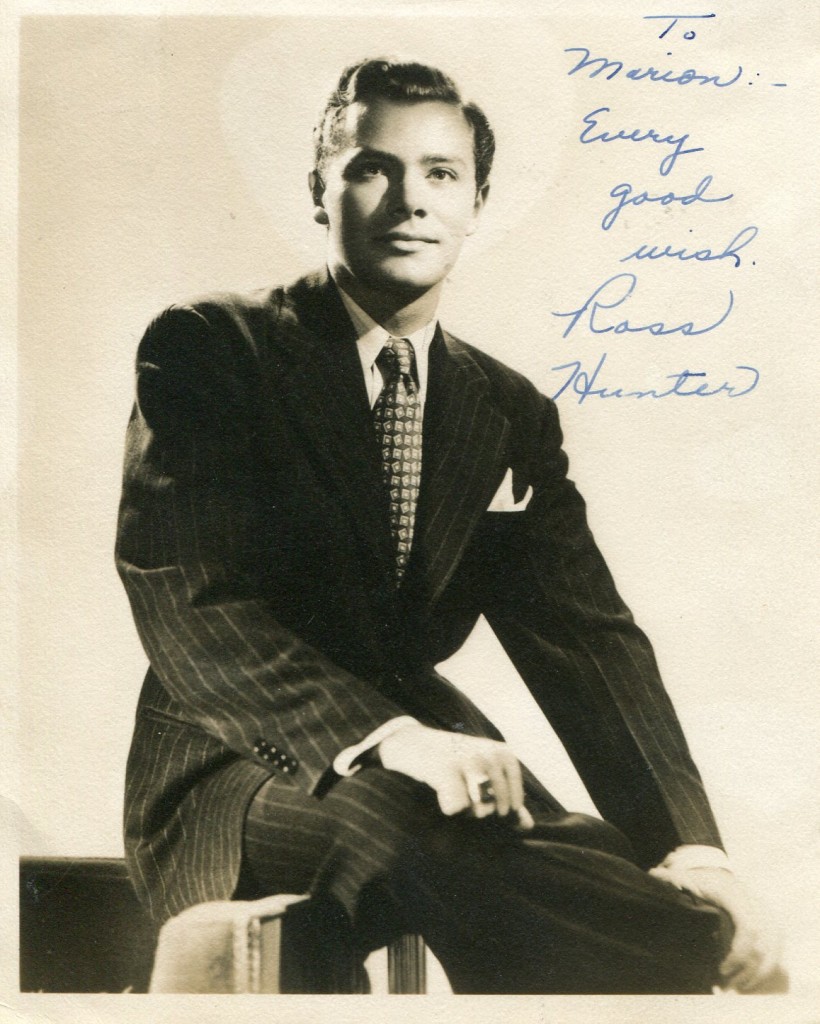
Ross Hunter was a very successful Hollywood producer who began his career as an actor. He was born in 1920 in Cleveland, Ohio. His acting debut in movies was in 1944 in “Louisiana Hayride”. His other acting credits on film include “Hit the Hay” and “The Bandit of Sherwood Forest”. As a producer, he was involved in such popolar successes as “Magnificent Obsession” with Rock Hudson, “All that Heaven Allows”, “Captain Lightfoot”, “Midnight Lace”, “Pillow Talkl2 and “Airport”. He died in 1996.
David Shipman’s “Independent” obituary:
A former schoolteacher who dabbled in acting, his first job in Hollywood was as the romantic interest in Louisiana Hayride (1944). Leads followed in a handful of other Columbia B-movies, but when offers dried up he returned to teaching. After some stage work, producing and directing, he was back in the studios as dialogue director and occasional writer. In 1951 he became an Associate Producer at Universal, which had seldom made a wiser move.
Hunter’s first film as producer, Take Me to Town (1953), starred Ann Sheridan, perhaps the most undervalued of all the great Hollywood stars. Barbara Stanwyck starred in Hunter’s second film, All I Desire. Like many gay men, Hunter idolised the big female stars. Those who arrived at Universal were not always on the way down, but they had in common the fact that they had made their names elsewhere. Hunter put them back into glossy melodramas – but the sort which American critics found so old-fashioned that Universal showed its films only to the trade press in Britain for the whole of that decade.
Those two particular movies were directed by Douglas Sirk, a German emigre. When he and Hunter made a pro-Indian Western, Taza, Son of Chochise (1954), it seemed to prove that they were happy in any genre. Its star was Rock Hudson, whose career received a huge impetus when he played opposite Jane Wyman in Magnificent Obssession (1954), and Hunter reunited the stars and director for another tearjerker, All That Heaven Allows (1956), with Wyman as a widow who defies New England society by marrying her gardener.
Anne Baxter co-starred with Hudson in One Desire (1955) and with Jeff Chandler in the fifth and worst version of The Spoilers (1955), while Debbie Reynolds arrived for two sentimental tributes to teenagers, Tammy and the Bachelor (1957) and This Happy Feeling (1958); and Barbara Stanwyck did her woman-of-the-world job again in another remake, There’s Always Tomorrow (1956). June Allyson did two more remakes, Interlude (1957) and My Man Godfrey (1957).
But if Hunter’s policy of remakes looked haphazard to his bosses he did come up trumps with Imitation of Life (1959), in which Lana Turner took Claudette Colbert’s old role as a widow who is having trouble with her daughter. The public turned up in large numbers to see Turner, whose career was unharmed by the scandal a year earler, when her daughter knifed her lover. Hunter immediately put her into another glossy melodrama, Portrait in Black (1960), but yet another rehash, Madame X (1966) found patrons no longer anxious to see Turner.
However, in teaming Hudson with Doris Day in Pillow Talk (1958), Hunter set off Universal’s most successful series of films since the Deanna Durbin musicals. They were based on the slapstick comedies of Durbin’s era, with luscious people in plush settings and more than a hint of salaciousness. Hudson only did three with Day, although as he said himself people thought there were more. The only other one produced by Hunter himself was The Thrill of It All (1963), when Day’s frustrating husband was, in fact, James Garner.
The Chalk Garden (1964) should be noted, if only because it turned Enid Bagnold’s play into a vehicle for moppet Hayley Mills. The Pad and How to Lose It (1966) was another travesty of another superior West End drama, in this case Peter Shaffer’s The Private Ear. Hunter then engaged Julie Andrews, Hollywood’s brightest new talent, for a musical set in the 1920s, Thoroughly Modern Millie (1967): like most of his films the tone was excessive but the star was showcased beautifully, and admirably supported by such drolls as Beatrice Lillie and Carol Channing. The result was the biggest success in Universal’s history, taking more than $15 million in the domestic market, but three years later Hunter’s Airport, from a novel by Arthur Hailey, topped that with a whopping $45 million. At this point Hunter set his sights on remaking Frank Capra’s Lost Horizon (1973) – with music. This was one of the most prestigious movies in Columbia’s past and they had no intention of selling the rights to Universal. Hunter moved to Columbia, engaged Burt Bacharach and Hal David to write the score, with a cast headed by Peter Finch, Liv Ullmann, John Gielgud and Michael York, who recalled Hunter as ebullient and radiating confidence – qualities sorely needed when critics scoffed at the result. Their notices killed any box-office potential and with it, overnight, Hunter’s movie career. He moved to Paramount in 1974, but the work he did there was for television: The Lives of Jenny Dolan (1975), the pilot for a series with Shirley Jones, and The Moneychangers (1976), a mini-series from Arthur Hailey’s novel, with Kirk Douglas and Anne Baxter. These aired on NBC, which Hunter joined to produce another mini-series, The Best Place To Be (1978), with Donna Reed and Helen Hayes.
David Shipman
Martin Fuss (Ross Hunter), film producer, actor: born Cleveland, Ohio 6 May 1926; died Los Angeles 10 March 1996.
The above “Independent” obituary can also be accessed online here.


